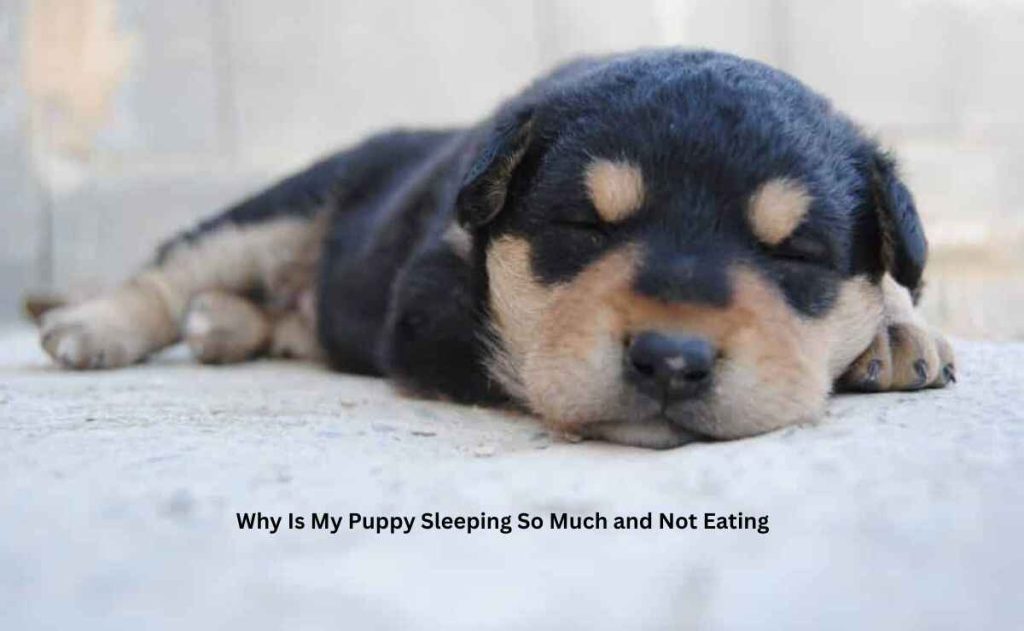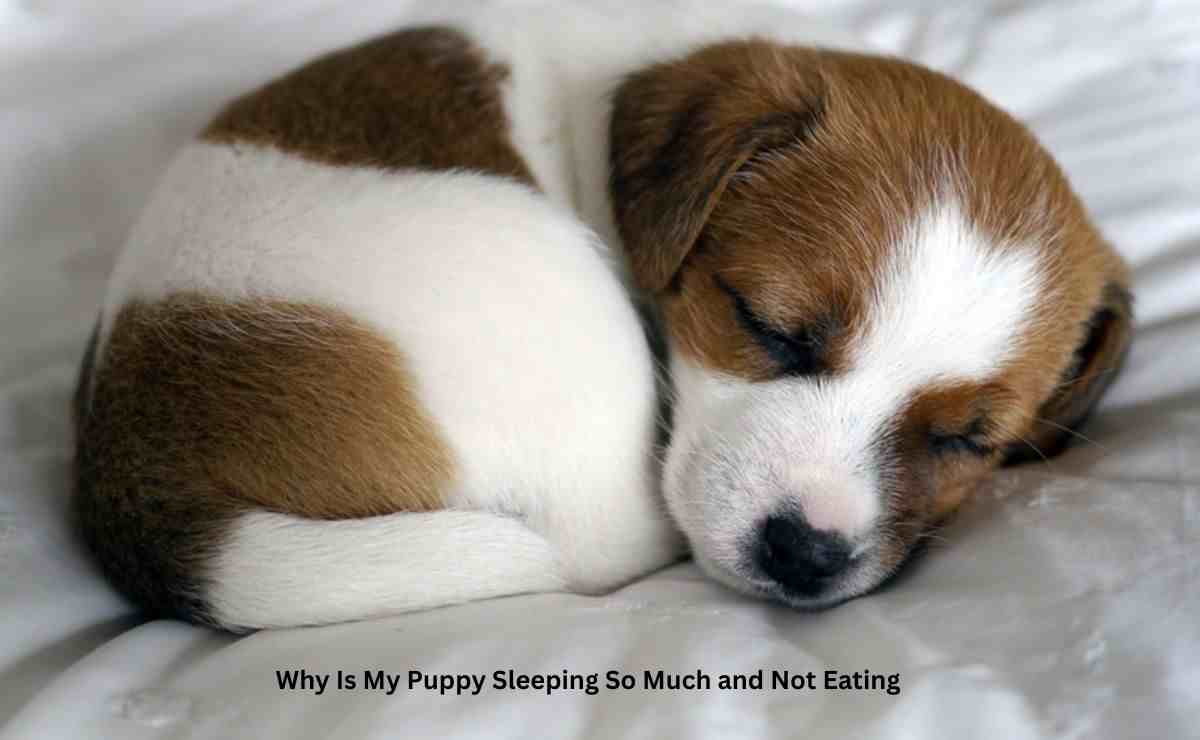It is concerning for the owner, “why is my puppy sleeping so much and not eating.” If you know the most common reasons, you can take steps to prevent further harm to your puppy. First, it’s vital to remember that every dog is different.
There are probably many causes, but getting a competent veterinary opinion is essential. The best way to begin discussing your puppy’s behavior with your veterinarian is to become familiar with some broad insights and tips.
Start fixing the problem by considering what could affect your puppy’s eating and sleeping habits. With this knowledge, you can take preventative measures to assist your dog to restore its strength and appetite.
Why is My Puppy Sleeping so much and Not Eating?

Worrying about your puppy’s health when you notice it is sleeping excessively or refusing to eat is normal. These actions usually have some causes. Your puppy’s health and well-being depend on your ability to correctly diagnose the cause of its sleepiness and loss of appetite.
Your puppy’s sleepiness and lack of appetite may be due to various factors which are discussed below.
Parasitic, Bacterial, and Viral Infections
Parasitic, bacterial, and viral infections might affect your puppy’s sleep and eating. Inner parasites like roundworms and bacteria can cause stomach pain, drowsiness, and appetite loss. So, Puppies Should Be Dewormed properly to get rid of these types of inflectional diseases.
Ticks or fleas can lead to itching and pain, changing sleep habits and causing your puppy to nap more. Bacterial illnesses can produce weariness, less hunger, and sleepiness. Viral diseases like distemper may lead to fragility, low appetite, and excessive sleep. Consult a vet for accurate medical care if you detect it.
Organic/Metabolic Diseases
Your puppy could have a medical issue if it isn’t eating and resting a lot. Because of these issues, they may lose motivation and hunger. Metabolic illnesses happen to malfunctions in the body’s chemical responses.
Organic disorders refer to dysfunctions. Both tiredness and a lack of hunger are possible outcomes of the situation. You must take your puppy to the vet to find out what is wrong with it and how to treat it.
Anemia
Anemia can be a reason if your puppy isn’t eating and resting a lot. When there aren’t enough red blood cells in the body, a disease known as anemia results. As a result, your puppy may become lethargic and eat less.
The symptoms of anemia can be mild to severe, depending on the underlying reason. You should take your dog to the vet to find out what’s causing the anemia.
Poisoning
Puppy poisoning symptoms include lethargy and excessive napping. A puppy’s body may respond to toxins by becoming lethargic and less hungry. When a puppy consumes anything toxic, it might negatively affect its body.
This makes them lethargic and uninterested in eating. Prompt treatment is critical to the animal’s health and recovery. Don’t wait to see a vet if you’re concerned about your pet’s health.
Pain
Some painful conditions could explain why the puppy is sleeping and not eating. Discomfort from pain can limit one’s appetite, which might contribute to weight loss. Pain can also make the puppy tired and want to nap more often.
You should monitor your puppy’s actions and talk to your vet to determine what’s wrong and how to treat it.
Depression
It’s crucial to rule out depression as a cause of your puppy’s excessive napping and lack of appetite. Depression relates to sleep and hunger disturbances in people and animals. Puppy depression can have multiple root causes.
It can be social isolation, the death of a companion animal, or physical illness. Make an appointment with your vet to discover any medical issues and get advice on handling your puppy’s behavior.
What to do When My Puppy is Sleeping So Much and Not Eating?
Keeping a close eye on your puppy’s behavior is essential. You should first take stock of the issue to determine whether any recent alterations to their habitat or routine are to blame for their distress.
Their usual demeanor may change if they react to new stimuli, environments, or loud noises.
Examine your puppy visually to look for any outward indications of distress. Check for fever, mucus discharge, large glands, and other symptoms of illness. You should immediately take them to the vet if they haven’t eaten in over 24 hours or show signs of thirst.
Provide a calm and cozy spot for your puppy to sleep. Please give them a comfy, warm sleep place, far from distractions. Provide your puppy with healthy, age-appropriate nutrition regularly. Do not risk intestinal problems by giving them snacks or table trash.
Moderate play and brief walks will do wonders for your puppy’s appetite and health. When someone shows symptoms of exhaustion or illness, it’s important to take extra care.
You must visit your veterinarian if your puppy lacks food and excessive sleep. Veterinarians are experts in examining animals fully, running any necessary testing, and offering sound advice and care.
Remember that a trip to the vet is still the best bet for a proper diagnosis and treatment, no matter how useful these tips may be.
When to Visit a Vet?
These are less serious issues that can arise with the puppy and may not immediately require emergency vet care.
Monitor the pet for a few more days. Ensure it has plenty of rest, food, and water, and see how it does. These will help put the pet more at ease as it works through its problems.
1.Having a Fever: See if the puppy has a temperature. Puppies with high body temperatures often appear listless and refuse to drink water. If the puppy has a temperature of 103 degrees or higher, you can help bring it down by placing a fan near it.
You can apply cold water to its ears and paws using a wet towel. Stop giving the puppy water after its temperature drops below 103 degrees. But keep an eye on it to ensure the fever doesn’t return.
If the temperature rises above 106 degrees, it’s time to see the vet. It could signify something more serious.
2. Not Eating Enough: When a puppy isn’t feeling well, it’s normal for them to become picky eaters. It may be a passing phase if the puppy suddenly loses interest in eating. You should give it plenty of water and playtime to stay healthy.
3. Feeling Scared: Watch for behaviors like tail tucking and trembling and strange reactions like hiding. It’s crucial to reassure your puppy if it’s been afraid.
Provide a safe space to retreat whenever they need to calm their racing thoughts or overcome their fears. They won’t feel as lonely if you spend more time with them and engage in playful interaction.
4. Dry Mouth: Look for dry mouth or gums, which can be indicators of dehydration. Carefully examine your puppy’s gums and tongues.
You may need to increase your water intake if you are cracked and thirsty. If they are pale and wrinkly, then they may be dehydrated.
5. Teething: The teething period for a puppy is a time of great discomfort.
The puppy might bark more and eat less than normal since the discomfort makes eating painful.
If this sounds like your baby, watch for other teething symptoms like excessive biting and gnawing, irritation around the mouth and gums, excessive salivating, and gum swelling.
Frequently Asked Questions (FAQs)
How long can puppies sleep without eating?
In contrast to more mature canines, puppies rarely store food as fat. In light of this, they have a 12-hour maximum fasting window.
In the case of toy breeds, this is especially important because hypoglycemia can cause serious harm. Dehydration is a greater risk for puppies than it is for adult dogs.
Why is my 8-week-old puppy sleeping and not eating?
You should consult a vet if your 8-week-old puppy is without food in 24 hours and is acting unusually subdued. After your hyperactive puppy gets used to his new home, he may start eating again.
What are common illnesses in puppies?
Puppies often fall ill with contagious viral infections like parvovirus and distemper, impairing the puppy’s respiratory, digestive, and neurological systems. Puppy coughing, intestinal parasites, and pup diarrhea are among the more frequent ailments.
Should I be worried if my puppy is sleeping so much and not eating?
Your puppy may become lethargic, apathetic, and lack food due to infections, diseases, or pain. Having these signs for longer than 24 hours may suggest a serious health problem that needs to be checked at the vet.
What are the signs of a sick puppy?
Puppy illness symptoms include poor appetite, nausea, vomiting, tiredness, coughing, sneezing, runny nose, red or puffy eyes, struggling, odd behavior, and a lackluster coat. If your puppy exhibits these signs, you must immediately take it to the vet.
Conclusion
It is tense for owners to come to the vet and say, “Why Is My Puppy Sleeping So Much and Not Eating?” Environmental variables, injuries, infections, and stresses are only a few causes of anorexia in pups.
If the puppy suddenly begins to sleep all day and refuses to eat, you should keep a tight eye on it for a couple of days. Things could be transient and improve rapidly.
If things aren’t improving after a while, it’s time to see a vet. The puppy will be put through a battery of tests to determine the root of its lack of appetite and listlessness.
